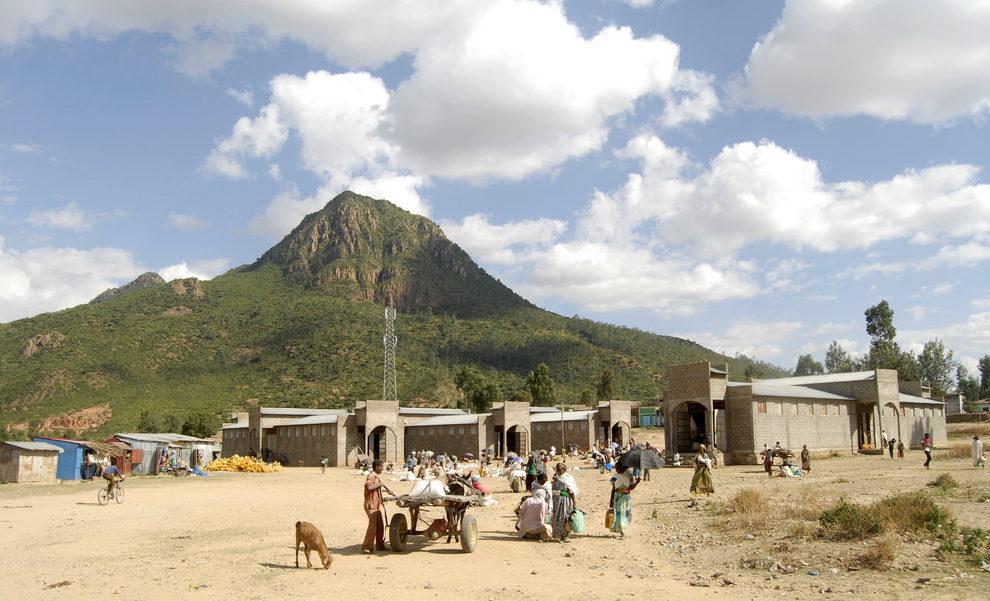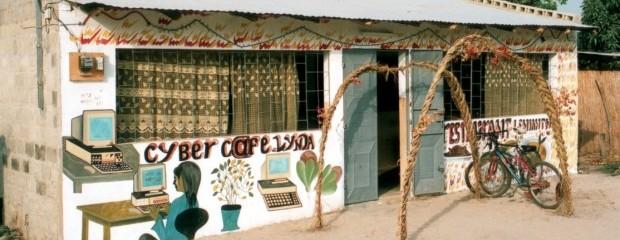Ethiopia uprising: Whither solidarity?

Amidst the unrest, history has the capacity to both unite and divide.

Adwa is celebrated as a symbol of Ethiopia’s unity, but the history is contested. Credit: Kris Fricke.
On the breezy morning of 2 March, a colourful crowd of mostly young people gathers in the heart of Addis Ababa. They are here to mark an important moment in Ethiopian history. On this day in 1889, Ethiopia decisively fought off Italian invaders at the Battle of Adwa, securing the country’s sovereignty.
As he waits for the speaker of parliament to deliver a speech, a young attendee called Henock takes a selfie with an elderly man in traditional attire. He checks his smartphone to see if the statue of Menelik II – the 19thcentury king who led the army of mostly untrained farmers to defeat Italian colonisers – made it into the photo.
Henock has been to these celebrations before, but “this year’s is quite different,” he says. “The crowd here is bigger and the government unusually gives it much attention.”
Henock suggests that this is because of growing controversy around the day that, he says, is “getting stronger by each year”.
While the Battle of Adwa has typically been seen as a symbol of Ethiopia’s unity and pride, this history has become increasingly contested.
In particular, members of the Oromo, Ethiopia’s largest ethnic group, have pointed to King Menelik’s alleged aggression against their people after his triumph over European intruders. This narrative was revived as the Oromo have protested in huge numbers against the government in 2015 and 2016, claiming that they were marginalised and discriminated against.
[Ethiopia’s unprecedented nationwide Oromo protests: who, what, why?]
According to Zelalem Kibret, a researcher at New York University’s Centre for Human Rights and Global Justice, the politicisation of history in Ethiopia is not new. But he argues that it has escalated over the past two decades under the leadership of the Ethiopian People’s Revolutionary Democratic Front (EPRDF).
“That is [proving] to be an impediment in building a better future,” he says.
When the EPRDF assumed power in 1991, it introduced a new federal system based along ethno-linguistic lines. Identity, politics, and history were redefined on these grounds.
However, this new structure was not accompanied by national dialogue. Meanwhile, the EPRDF gradually came to dominate the entire political landscape, suppressing opposition and dissent.
As early as 2009, International Crisis Group warned that the federal structure was promoting ethnic assertiveness while failing to accommodate grievances. It spoke of “increased ethnic awareness and tensions created by the regionalization policy and their potential explosive consequences”.
Tipping point
These consequences were realised in late-2015 and 2016 as hundreds of thousands of Oromo protested against the government. Largely driven by youth with a strong sense of ethnic identity, demonstrators demanded greater autonomy, justice and equality. They demanded the promises of the federal arrangement “never matched by the reality on the ground”, says Birhanu M. Lenjiso, a US-based academic and political commentator.
The Oromo were later joined by the Amhara, the country’s second largest sub-nation. Triggered by border disputes with the neighbouring state of Tigray, these protesters went on to raise their own complaints of marginalisation and repression.
According to a report by the state-led Human Rights Commission released this April, 669 people were killed in the widespread clashes that followed. State-affiliated businesses and foreign owned investments were set ablaze. Meanwhile, members of the minority Tigray ethnic group – who many see as having disproportionately benefitted from the EPRDF’s rule despite making up just 6% of the population – were reportedly forced to flee protest prone areas en masse.
In October 2016, the government declared a state of emergency in an attempt to clamp down on the unrest. Tens of thousands of alleged protesters were arrested and a semblance of calm returned.
[Never Again? Inside Ethiopia’s “retraining” programme for thousands of detained protesters]
However, in February, conflicts were reported in the border areas between Oromiya and Ethiopia’s Somali regional state. Meanwhile, in the northern parts of the Amhara state, armed farmers are reported to be clashing with the military. Following four grenade attacks in April in the Amhara town of Gondar, the US state department issues a warning for travellers to the area.
Recognising the ongoing fragility, the government extended the decree for four more months this March. “We still have some anti-peace elements that are active and want to capitalise on disputes that arise among regional states in the country,” said Defence Minister Siraj Fegessa.
The battle for history
While using its security apparatus to impose a sense of stability, the government also appears to have acknowledged the importance of ethnic nationalism in the country’s worst political crisis in decades. In response, it has started stressing the importance of unity and patriotism; holidays like Adwa get a more spirited observance.
Moreover, the September 2016 edition of Addis Raey, the ruling party’s ideas magazine, was uncommonly self-critical. It conceded: “since the youth in Ethiopia mainly grew up under the EPRDF’s administration, they could not inherit patriotic feelings and love of one’s country evident in the previous generation; for this there cannot be any doubt that the blame rests entirely on the EPRDF.”
Zelalem is not sure if these actions mark a radical ideological shift. For him, ethnicity and the battle over history will continue to be a decisive factor in Ethiopia’s political future. And not just in terms of the Oromo and Amhara communities’ relations with the government but also with one another.
At the pinnacle of the protests in 2016, the two groups – which together make up two thirds of the population – joined hands against what they saw to be a common enemy. Amhara protesters held placards that read messages such as “The blood flooding in Oromia is our blood too” and “We are all Oromos”.
[Why Oromo-Amhara solidarity is the greatest threat to the Ethiopian government]
However, for Zelalem, this solidarity remained superficial and was not backed up by a willingness to compromise or forge a shared vision. Once the government clamped down, he says, elites from both groups retreated to their own camps, still divided by the age-old contentions that have impeded unity in the past.
Birhanu agrees with this account, but stresses that the leaders, who are mostly based abroad, are not one and the same as the youth, who were at the heart of the protests in Ethiopia. “The youth listen to the elites,” he says. “But they also live on the ground.”
According to Birhanu, it was these young protesters that originally expressed solidarity across ethnic lines, only forcing the groups’ leaders to come on board later on.
Ahmed (name changed), a young protester from Gondar, explains that ahead of a mass demonstration in July, it was local organisers that made plans to magnify solidarity with “our Oromo brothers”. Banners were made with pictures of Oromo opposition leaders alongside slogans declaring support.
These activities, says Ahmed, were conceived of and executed “by us”. “The diaspora saw what we did only after images started circulating on social media,” he says.
The unity that resulted from these actions may have been short-lived; the two groups are also divided by ancient disputes that will always make coming together difficult. But Birhanu argues that deeper solidarity between the Oromo and Amhara going forwards is not impossible or even unlikely. Pressured by young grassroots demonstrators, the ethno-nationalist leaders may find a way to stand together and resolve their historical differences, he suggests.
This would be a hugely powerful development in the resistance against the government. But for now, Ahmed lacks Birhanu’s optimism about the elites’ ability to do this. “I don’t expect that kind of courage soon”, he says.





